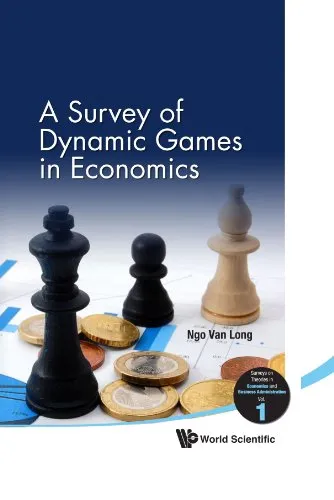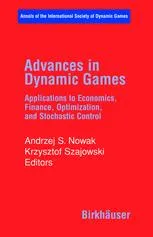A Survey of Dynamic Games in Economics (Surveys on Theories in Economics and Business Administration)
4.0
Reviews from our users

You Can Ask your questions from this book's AI after Login
Each download or ask from book AI costs 2 points. To earn more free points, please visit the Points Guide Page and complete some valuable actions.Related Refrences:
Introduction to "A Survey of Dynamic Games in Economics"
Welcome to "A Survey of Dynamic Games in Economics", a comprehensive exploration of dynamic game theory and its integral role in understanding and solving complex economic challenges. This book is a part of the "Surveys on Theories in Economics and Business Administration" series, where we delve deep into theoretical frameworks and their applications. Written for academics, professionals, and curious minds alike, it combines rigorous theory with practical insights to illuminate how strategic interactions evolve over time in economic contexts.
In today’s interconnected and competitive global economy, decision-making often involves anticipating the actions of others while strategically planning one's moves. Dynamic game theory offers a powerful lens to study and evaluate such scenarios, providing a structured approach to analyze sequential decisions and evolving strategies. This book surveys a wide variety of models, tools, and applications that highlight how dynamic games have shaped modern economic thought.
Detailed Summary of the Book
The book is organized around the fundamental principles and applications of dynamic games in economic contexts, offering readers a balanced blend of theory, methodology, and real-world examples. It begins with an introduction to the basics of game theory and the distinction between static and dynamic games. Readers are carefully guided through essential concepts like Nash equilibrium, subgame perfect equilibrium, and Markov perfect equilibrium. Emphasis is placed on the nuances of dynamic interactions, where players’ decisions are not immediate but evolve across multiple time periods.
Subsequent chapters delve into specific economic applications, including industrial organization, resource economics, and macroeconomic policy-making. Examples cover areas such as oligopolistic competition, the tragedy of the commons, and government policies in the face of economic shocks. The book also highlights the role of asymmetric information and incomplete markets in shaping strategic decisions over time.
Readers will find an extensive discussion of methodological approaches, such as state-space models and differential games, which are indispensable tools in this field. The book balances formal derivations with intuitive explanations, making it accessible to both seasoned economists and those new to the discipline. Finally, a review of cutting-edge research and future directions closes out the survey, providing a clear roadmap for academics and practitioners interested in advancing the field.
Key Takeaways
- Dynamic game theory is essential for understanding decision-making processes that unfold over time, particularly in competitive or cooperative settings.
- Economic applications of dynamic games range widely, from market competition and environmental policy to political and macroeconomic strategy.
- Tools like state-space methods, differential games, and equilibrium refinements are indispensable for analyzing real-world problems.
- A deep understanding of dynamic games can lead to improved strategic planning and policy-making in both private and public sectors.
Famous Quotes from the Book
"A dynamic game is not merely a competition of strategies but a deliberate construction of adaptive foresight, where each move is both an action and a signal about future intentions."
"Understanding dynamic games in economics equips us with the ability to predict and influence outcomes in an ever-changing, interdependent world."
Why This Book Matters
In an era defined by rapid globalization, technological advancements, and ever-increasing economic interdependence, mastering the language of dynamic games is more relevant than ever. Economic agents—whether they are businesses, governments, or individuals—do not operate in isolation. Their choices, sequentially made and interlinked to those of others, shape the trajectory of industries, nations, and global markets.
"A Survey of Dynamic Games in Economics" provides an essential toolkit for analyzing these multi-period strategic interactions. By bridging rigorous mathematical foundations and insightful economic applications, it offers a compelling resource for researchers and professionals seeking to make informed decisions in a dynamic, complex world. Whether you’re a policy-maker grappling with the implications of climate change or a business strategist navigating market competition, this book equips you with the intellectual tools to navigate uncertainty and complexity strategically.
Free Direct Download
You Can Download this book after Login
Accessing books through legal platforms and public libraries not only supports the rights of authors and publishers but also contributes to the sustainability of reading culture. Before downloading, please take a moment to consider these options.
Find this book on other platforms:
WorldCat helps you find books in libraries worldwide.
See ratings, reviews, and discussions on Goodreads.
Find and buy rare or used books on AbeBooks.
1230
بازدید4.0
امتیاز50
نظر98%
رضایتReviews:
4.0
Based on 0 users review
"کیفیت چاپ عالی بود، خیلی راضیام"



